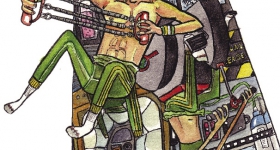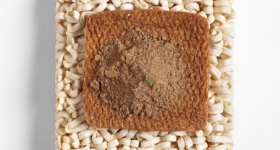Anthony Chiu had just enjoyed a dish of chicken curry when he was seized with a terrible stomachache. Indigestion, he thought. The pain subsided so Chiu dismissed the episode, visited the same Vietnamese restaurant a week later and ate an identical dish of curry.
Again, gripping pain shot through his abdomen, and was so persistent this time that Chiu went to the emergency room. The diagnosis: a tumor had taken over half of his liver. His oncologist initially diagnosed the cancer inoperable.
“If it’s not operable, that means it’s pretty much it,” Chiu recalls. “We were preparing for the worst.”
“It was a shock to me,” he says. “Even though I knew that I had hepatitis B for about 15 years and I knew there was a chance that it would turn into liver cancer, I never expected it would happen to me.”
The Hong Kong-born Chiu is a Columbia graduate and software engineer, and was only 32 years old when diagnosed. He didn’t drink or smoke and had annual checkups. He thought his lifestyle was healthy and had never shown any symptoms of the disease.
Chiu’s story is a familiar one to Dr. Samuel So, director of the Stanford Asian Liver Center. He says that Asian American men are four to 13 times more likely to contract liver cancer than their white counterparts. That’s because Asian-born Americans are disproportionately infected with the hepatitis B virus — 5 to 15 percent (depending on age and country of origin), versus one percent for whites.
“Eighty percent of liver cancer is caused by hepatitis B,” So says. “So you can prevent most cases of liver cancer, which kills over half a million people a year, by [administering] a safe and effective vaccine.”
The high rate of infection in Asian Americans is due to the disease’s prevalence in many Pacific Rim countries. According to Stanford University statistics, 67 percent of the world’s chronic hep B sufferers live in Asia and the Pacific Islands.
Chiu contracted the virus in infancy through his Hong Kong-born mother. Mother-to-child transmission is the most common route of infection for Asian Americans. The virus is transmitted like HIV, through bodily fluids and unprotected sex, but it’s 50 to 100 times more infectious than HIV and can live outside of the body for up to a week. Even sharing a toothbrush can pass the disease.
For unknown reasons, hepatitis B is more active in Asians, says Dr. Gary Euler, an epidemiologist at the Centers for Disease Control. “There’s more activity, more viral replication.” He explains that higher concentrations of the virus means it spreads more easily through the population.
The contagion often goes undetected because about half of the people infected show no symptoms at all and when they do, they can easily mistake the disease for the flu. Usually, the only way to diagnose the disease is to specifically order a hepatitis B blood test; even standard liver examinations won’t detect the infection.
“You can have perfectly normal so-called ‘liver functions’ on your blood test, but also have chronic hepatitis,” So says. “That’s why we call it a silent killer, a silent epidemic.”
When chronic hepatitis B goes untreated, it develops into fatal liver cancer or cirrhosis for one in four people. By the time the person feels sick, the liver may be damaged beyond repair. “It’s always bad when people with chronic hep B have symptoms,” So says.
In Anthony Chiu’s case, Dr. So provided a more positive prognosis and found his condition treatable. Within a month, Chiu’s tumor was removed, followed by a precautionary round of chemotherapy.
The best way to treat the disease, though, is to catch it early. A simple blood test (the hepatitis B surface antigen test) will detect the virus, and newly developed drugs can reduce the viral count and liver damage. Known carriers are then regularly screened for cancer, and hopefully can detect any symptoms early on. For those who test negative, an inoculation will eliminate any further concern.
“It’s only, for heaven’s sake, a $10 blood test,” So points out. But many American-born 20- and 30-somethings assume they’re immune and don’t get screened. “A lot of people say, ‘Oh, I got tons of vaccines when I was a kid,’ but if they’re over 20, the chances are they never got a hepatitis B vaccine as a child because the vaccine wasn’t available at that time.”
Doctors often fail to recommend the test, unaware of the increased risk for Asians and the need for carriers to be screened early and often for liver damage and cancer. “There’s a great need to educate the doctors as well,” So points out. He mentioned mentions Mark Lim, a young San Francisco doctor who knew he carried the hepatitis B virus but believed regular liver exams weren’t necessary until his fifties. Lim discovered he had late-stage cancer when he was 30 and died 14 months later.
To promote awareness of the dangers faced by Chiu and so many others in the Asian American community, So launched the Jade Ribbon Campaign in 2001. With multilingual TV and radio spots, a hotline, website and outreach programs geared for different ethnic groups, the project urges APIs to be screened.
Now, two years after the surgery, Chiu says he’s “totally healthy.” He exercises, watches his diet, and has cut down on overtime and stress. He gets regular liver examinations. And, just in case, he doesn’t eat curry at that restaurant anymore. “Bad vibes,” he says. “Bad vibes…”








Comments